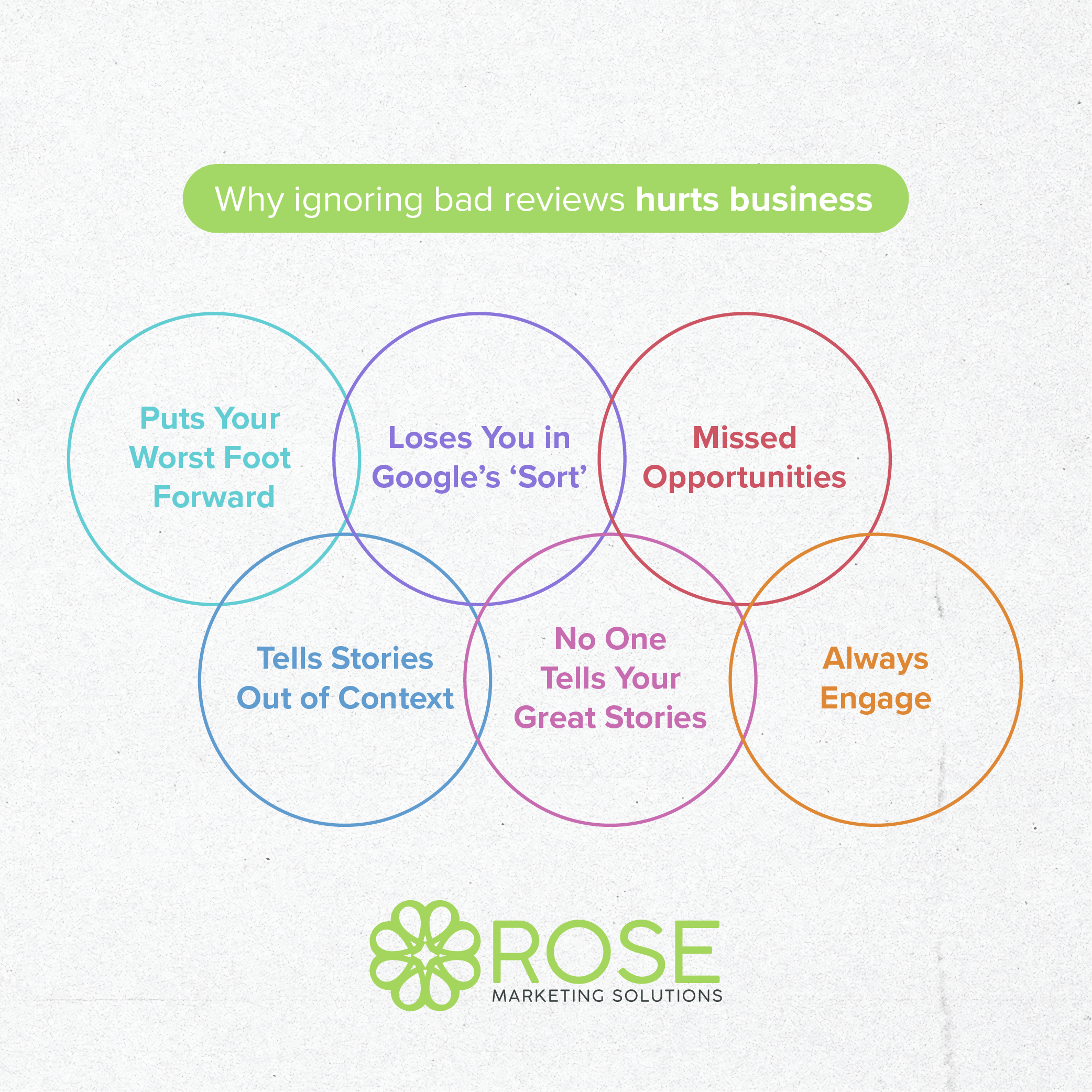Reviews can make or break your business. So before you spend money on a new ad campaign, it’s important to take the time to clean up any online messes in your digital reputation.
We’ve talked before about the importance of preparing before you run paid ads with our Google Ads Checklist. In this post, we’ll look at the specific reasons to fix your online reputation before running paid ads and the potential repercussions if you don’t.
Facts Tell, Stories Sell
As of 2020, consumer research shows that at least 79% of people trust online reviews as much as a recommendation from a friend or a family member. Consumers report that reviews influence over 90% of their purchasing decisions. For local businesses, 77% of your potential customers regularly read online reviews before deciding to do business with you, and only 2% avoid local online reviews altogether.
With those kinds of statistics, managing your online reputation has to be a priority, especially when you’re planning a paid ad campaign.
Online reviews provide the avenue for your customers to become your brand ambassadors, helping other potential customers trust you. To potential customers, what you say is advertising, but what their friends (and online reviews) say is truth.
Your online reputation tells the story of how your business interacts with customers in real life. The reviews your customers leave online can paint a picture of brand loyalty, or of warning and regret.
Why Bother Addressing Negative Reviews?
The big idea here is that running paid ads without first addressing negative online reviews leads to wasted ad investment. You’re essentially paying to direct traffic to your business’s detractors and giving bad reviews even more exposure than before.
You pay for every click to your website, but based on those statistics above, we know visitors probably still check reviews before making a purchase or commitment. So a poor online reputation leads to a lot of wasted ad spend. It takes about 40 positive reviews to make up for a single negative review in the eyes of potential customers, so mitigation is crucial.

Why Ignoring Bad Reviews Hurts Business
Addressing bad reviews can be intimidating and frustrating, and many business owners simply don’t know how to respond. But ignoring them is a mistake. When you leave bad reviews untouched, other potential customers only see the negative narrative.
It creates an echo chamber for curiosity and doubt. And that’s definitely bad for business.
The consequences of ignoring negative reviews are bad enough on their own, but they have a compound effect when you start running paid ads. Even no reviews at all will have a discouraging impact. We’ll walk through the consequences of leaving a poor online reputation to itself below.
1. Puts Your Worst Foot Forward
When you have unaddressed negative reviews during a paid ad campaign, you’re taking new prospects who are interested in your services and introducing them to an instance when your service didn’t work as intended (or was perceived not to not). That’s not the first impression any business wants to make.
2. Tells Stories Out of Context
Many times, bad reviews are old reviews. They accurately represent what’s going on in your school or business right now, but readers have no way of knowing that. It’s critical to respond to bad reviews to give readers more of the story.
3. Loses You in Google’s “Sort”
Previously, experts considered reviews between 4.2 and 4.8 to be the gold standard. “5 stars” sounded fake, so you wanted more “believable” reviews for you business.
Now, however, Google offers a “sort” option for searchers, which shuffles and lists businesses according to their review ratings. At the top are all the 5-star companies, and that list can run long. If your business has a 4.5 rating, people may not scroll far enough to see it at all.
Today, to have the best chance at being found, you want the highest review rating possible. (We’ll discuss how to request reviews naturally from your customers in a moment.)
4. No One Tells Your Great Stories
A lack of reviews can be just as damaging as negative reviews. Reviews are where the stories of your business get told. Without them, customers only have your website to go by — and remember, to them, that’s just advertising.
You simply can’t recreate the impact of people’s genuine stories about your company on your own website. You can’t tell the same stories your customers can.
Without any online reviews, your business misses out on the powerful benefit of those stories, and opportunities lost.
5. Missed Opportunities
When managing your online reputation, whether that’s negative reviews or a lack of reviews, it’s important to consider all platforms, not just Google.
Yelp is a great example. Many business owners don’t like Yelp and consider interacting with the platform a pain. However, Apple Maps — which is a popular and therefore important search method — pulls its information on businesses from Yelp. So instead of ignoring Yelp (or other prominent review sources for your business), it’s important to check on how your business appears. Otherwise, you could be shooting yourself in the proverbial foot.
6. Engage Appropriately
Engaging with customers who leave reviews, both good and bad, can make a major difference in the eyes of users reading those reviews. By responding, you show the public that you care deeply about your reputation and your customers’ experiences. You’re willing to communicate with people, and you’re responsive to both praise and criticism.
However, there are times not to engage. Some negative reviews leave you with a sense that if you respond, the reviewer may post again and the situation could escalate. In these cases, responding could do more harm than good.
It takes skill and practice to know when and how to engage with reviewers, but a little compassion and tact in a careful response go a long way. It lets the public see more of who you are and can greatly reduce the negative impact of a bad review.
How to Address a Bad Review: First Steps
A bad review can feel like a gut punch. If you come across one, it can help to have some clear steps to follow in addressing it.
First, always check whether the review violates any guidelines for that particular review site. Each platform has its own rules about hate speech, personal attacks, conflicts of interest, etc. If a review violates any of the guidelines for a platform, you as the business owner have the right to contact the platform and request they remove it. It’s not a guarantee, and it won’t be applicable for every negative review, but it’s a good place to start.
When a review doesn’t violate guidelines, the next step is to respond if appropriate. But sometimes, especially if a review is very emotional or lengthy, it’s a good idea to wait 24 hours to let the person cool off. If you post a response immediately, it could trigger more emotion rather than lead to a resolution.
After 24 hours, you can reach out to the customer offline to attempt to resolve their issue, with the goal that they would then remove or update the negative review. If you don’t have a way to contact the customer directly, you could post a response asking if they would be willing to talk further to resolve the issue offline.
How to Generate Good Reviews: First Steps
Your customers have lots of great stories to share about your company, they just don’t always think to do it. To encourage more positive reviews and bolster your online reputation, try to catch your customers at happy moments and ask if they’d be willing to leave a review about their experience.
Front desk staff or any customer-facing roles are a good fit for this task since they interact with customers often. They can catch those opportune moments and even make the process easy by providing the customer a link to a specific review site as they leave. If you need reviews on a particular site, this is a great way to boost activity there.
Make Online Reputation Management a Priority
Managing your online reputation is important. Before you start spending money on paid ads, make sure you take the time to investigate how your business’s reviews look to potential customers. Paid advertising can be a great way to boost business, but it won’t do much good if potential customers are scared away by bad reviews.
If you’d like help cleaning up your online reputation or setting up paid ad campaigns, contact Rose Marketing Solutions. We’re here to help!
Subscribe
Sign up with your email address to receive news and updates.

